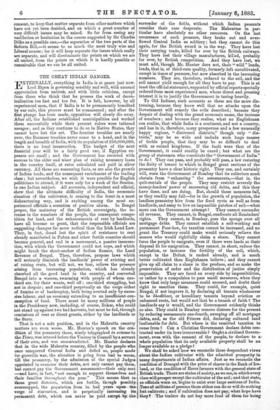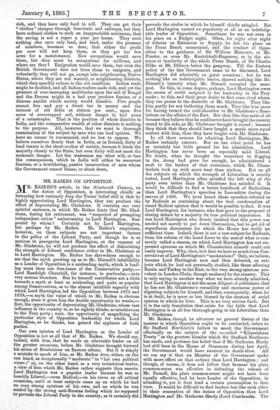THE GREAT INDIAN DANGER.
1p14. XTERNALLY, everything in India is at peace just now. Lord Ripon is governing sensibly and well, with unusual appreciation from native's, and with little criticism, except from those who think that he presses the work of decen- tralisation too fast and too far. It is felt, however, by all
i
experienced men, that if India to be permanently benefited by our rule, this process must be commenced ; and after the first plunge has been made, opposition will slowly die away. After all, the Indians established municipalities and worked them successfully while their present rulers were tattooed savages ; and as they continue to do so in Native States, they cannot have lost the art. The frontier troubles are nearly over, the Burmese troubles never come to a head, and in the length and breadth of India, with its population of 250,000,000, there is no local insurrection. The budget of the next finaicial year will be a fairly good one, if Egyptian ex- penses are small ; and the Government has recurred with success to the older and wiser plan of raising necessary loans in the country itself, at rates calculated and paid in silver currency. All these are reassuring facts, as are also the growth of Indian trade, and the consequent enrichment of the trading class ; but nevertheless, we wish it were possible for English politicians to attend, if it were only for a week of the Session, to one Indian subject. All accounts, independent and official, show, that the ultimate difficulty of India, the economic situation of the cultivator, is coming to the front in a most disheartening way, and is exciting among the most ex- perienced officials a sensation of positive alarm. In Bengal proper, the mainstay of the British sovereignty, the in- crease in the numbers of the people, the consequent compe- tition for land, and the enhancements of rent by landlords, have all become so great, that the responsible officials are suggesting changes far more radical than the Irish Land Law. They, in fact, dread lest the spirit of resistance to rent already manifested in Pubna and other fertile counties should become general, and end in a movement, a passive insurrec- tion, with which the Government could not cope, and which might break the sheet-anchor of Indian finance, the Land Revenue of Bengal. They, therefore, propose laws which will seriously diminish the landlords' power of evicting and of raising rents, but will not, we fear, relieve the pressure arising from increasing population, which has already. absorbed all the good land in the country, and converted Bengal into a • warren, swarming with people of whom one- third are, for their wants, well off ; one-third struggling, but not in despair and one-third perpetually on the verge either of famine or of bankruptcy, both being averted only by exces- sive labour, and an economy extending to an insufficient-con- sumption of food. There must be many millions of people in the Presidency now, including, of course, Behar, who could not stand up against two bad harvests, but must be fed, through remissions of rent or direct grants, either by the landlords or the State.
That is not a safe position, and in the Mahratta country matters are even worse. Mr. Hunter's speech on the con- dition of the peasantry there, wisely telegraphed in extensa-to the Times, was uttered before the Viceroy in Council by a servant of their own, and was uncontradicted. Mr. Hunter declares that in the wide Mahratta country, filled by the people who once conquered Central India and defied us' people made for guerrilla war, the situation is going from bad to worse, till the peasantry. by the admission of the special Judges. appointed to examine their debts, not only cannot pay them, but cannot pay the Government assessment—their only. rent —and have, in fact, "not enough to support themselves and their families throughout the year." This means that in these great districts, which are fertile, though possibly. overcropped, the population lives in bad years upon the verge of starvation, and is perpetually increasing its permanent debt, which can never be paid except by. the surrender of the fields, without which Indian peasants consider their case desperate. The Mahrattas in par- ticular have absolutely no other resources. On the last occurrence of such pressure, they broke out and over- flowed Central India as soldiery ; but they cannot do this again, for the British tiword is in the way. They have lost their carrying trade, killed for ever by the British railways. They have lost -their village manufactures, killed, probably for ever, by British competition. And they have lost, we must add, though Mr. Hunter does not, their " wild " lands, lands, that is, of third-rate quality, formerly.left uncultivated, except in times of pressure, but now absorbed in the increasing numbers. They are, therefore, reduced to the soil, and the soil cannot yield enough for all they have to pay. This is at least the official statement, supported by official reports- specially ordered from most experienced men, whose direct and pressing interest it is to justify the Government in taxing heavily. To Old Indians, such accounts as these are the more dis- tressing, because they know well that no attacks upon the Government will remedy the -evils described; because they despair of dealing with the grand economic cause, the increase of numbers ; and because they realise, what no Englishman can realise, that while India is a continent, and not a country, and has in it, therefore, many prosperous and a few unusually: happy regions, "distressed districts," though only "dis- tricts," may be so wide and include such huge masses of feeble people that they may be as difficult to deal with as ruined kingdoms. If the fault were that of the Government, it could readily be cured ; but what are the group of statesmen who constitute the " Government of India " to do ? They can pass, and probably will pass, a law restoring the fixity of tenure to which in Bengal great sections of the peasantry have a clear historic right. They can, and certainly will, warn the Government of Bombay that its collectors must abstain from " enhancing " the assessments,—that is the quit-rentals of the people. They may restrict severely the money-lenders' power of recovering old debts, and this they have done, and are doing. But, should these measures fail, as they readily may fail—for in the growth of population, the landless peasantry hire from the fixed ryots as well as from landlords, and essay to live on impossible patches of soil—what more can the Government attempt ? They cannot surrender all revenue. They cannot, in Bengal, confiscate all Zemindars' rights. They cannot, in Bombay, pass the sponge over all mortgage debts. They cannot establish a self-working and permanent Poor-law, for taxation cannot be increased, and no grant the Treasury could make would seriously relieve the masses who would rightfully claim a share. They cannot force the people to emigrate, even if there were lands at their • disposal fit for emigration. They cannot, in short, reduce the population, or increase the fertility of the soil, which, except in the Delta.§, is racked already, and is much better cultivated than Englishmen believe ; and they cannot 'give up all claim to a share in the produce, and so make the preservation of order and the distribution of justice simply . impossible. They are faced on every side by impossibilities, or rather by a compulsion to pass small measures, when they know that only large measures could succeed, and doubt their right to sanction them. They could, for example, quiet Bengal, if not improve it, by declaring all tenants whatsoever to be khodkhast, or hereditary tenants beyond eviction or enhanced rents, but would not that be a breach of faith ? The landlords say it would, and the Government evidently thinks so also. They could in Bombay remove distress for the present by reducing assessments one-fourth, sweeping off all mortgage debts, and, as the old Princes did, declaring cultured land inalienable for debt. But where is the remitted taxation to come from Can a Christian Government declare debts con- tracted under its laws irrecoverable ? Ought a civilised Govern- ment, even with the consent of the people, to declare to a• whole population that its only available property shall be no ;longer available as a pledge?
• We shall be asked how we reconcile these despondent views about the Indian cultivator with the admitted prosperity in many departments of Indian affairs. Just as we reconcile the condition of Donegal with the price of shares in the Bank of Ire- land, or the condition of Essex farmers with the general state of British trade. There are states of society, as we see, in which every class will prosper except the cultivator of the soil; and that state, as officials warn us, begins to exist over large sections of India. Tens of millions of persons there either can do or will do nothing but cultivate ; and if cultivation does not pay, what hope have they ! The traders do not buy more food of them for being rich, and they have only food to sell. They can get their " clothes " cheaper through free-trade and railways, but they have reduced clothes to such an inappreciable minimum, that the saving is not a rupee a year per house. They need • nothing else save only land, and land, under the pressure of numbers becomes so dear, that either the profit per acre will not keep them, or they get too few acres for a maintenance. New occupations would save them, but they must be occupations for millions, and where are they Emigration woula save them, but even the British Government dare not force them to emigrate, and voluntarily they will not go, except into neighbouring Native States, where they are not wanted, or neighbouring districts, which they speedily reduce to the old condition. Indian trade might be doubled, and all Indian traders made rich, and yet the pressure of ever-increasing multitudes upon the soil of Bengal and the -Deccan might in a bad year produce famine, or a distress amidst which society would dissolve. Five people cannot live and pay a direct tax in money and the interest of old debts at sixteen per cent., upon five acres of overcropped soil, without danger in bad years of a catastrophe. That is the position of whole districts in India, and the comparative wealth of other districts is nothing to the purpose. All,, however, that we want is thorough examination Of the subject by men who can feed opinion. We have no course to recommend, and no law to oppose. We believe ourselves firmly that in India, as in Ireland, fixity of land tenure is the sheet-anchor of society, because it binds the majority closely to the State, but even fixity will not meet the economic danger. Let the statesmen lay what will, or face the consequence, which in India will either be recurrent famines, or a bewildering, passive insurrection of men whom the Government cannot blame, or shoot down.















































 Previous page
Previous page